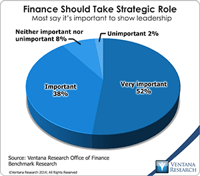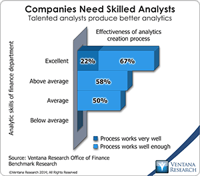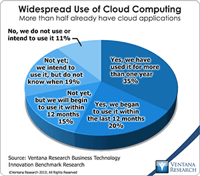Finance transformation” refers to a longstanding objective: shifting the focus of CFOs and finance departments from transaction processing to more strategic, higher-value functions. Our upcoming Office of Finance benchmark research confirms that most of organizations want their finance department to take a more strategic role in management of the company: nine in 10 participants said that it’s important or very important. (We are using “finance” in its broadest sense, including, for example,...
Read More
Topics:
Big Data,
Mobile,
Performance Management,
Predictive Analytics,
Social Media,
ERP,
FP&A,
Office of Finance,
Reporting,
Management,
close,
closing,
computing,
Controller,
Tax,
Analytics,
Business Analytics,
Business Collaboration,
Cloud Computing,
Collaboration,
Business Performance Management (BPM),
CFO,
finance,
Financial Performance Management (FPM),
Tagetik,
FPM
Finance and accounting departments are staffed with numbers-oriented, naturally analytical people. Strong analytic skills are essential if a finance department is to deliver deep insights into performance and visibility into emerging opportunities and challenges. The conclusions of analyses enable fast, fully informed business decisions by executives and managers. Conversely, flawed analyses undermine the performance of a company. So it was good news that in our Office of Finance benchmark...
Read More
Topics:
Big Data,
Mobile,
Planning,
Predictive Analytics,
ERP,
FP&A,
Office of Finance,
Reporting,
Self-service,
Budgeting,
close,
closing,
computing,
Controller,
dashboard,
Tax,
Analytics,
Business Analytics,
Business Intelligence,
Cloud Computing,
Collaboration,
Business Performance Management (BPM),
CFO,
Data,
finance,
Financial Performance Management (FPM),
Tagetik,
Financial Performance Management,
FPM,
Microsoft Excel,
Spreadsheets
There’s a growing realization that the multitenant approach to the cloud isn’t the only option that companies should weigh in deciding between deploying software on-premises and in the cloud. That some people describe the multitenancy approach as “the real cloud” reflects the contentious nature of some technical debates, especially those that occur early in the evolution of a new technology. Multitenancy does have advantages that confer cost savings, and these have been important in the first...
Read More
Topics:
Microsoft,
Mobile,
SaaS,
Sales,
Salesforce.com,
ERP,
HCM,
Human Capital,
Office of Finance,
Planview,
Concur,
Dynamics AX,
Dynamics GP,
Dynamics NAV Dynamics SL,
PSA,
Sage Software,
Unit4,
Analytics,
Cloud Computing,
Business Performance Management (BPM),
CFO,
Financial Performance Management (FPM),
FinancialForce,
HR,
Infor,
Tagetik,
Workday,
Workforce Performance Management (WPM),
Plex
If you’re considering purchasing a financial performance management (FPM) suite, you shouldn’t overlook a recent entrant in the category, Tagetik (which sort of rhymes with “magnetic”). The company, which was founded in 1986 and is based in Lucca, Italy, began by focusing mainly on Europe, but has extended its efforts in the United States in the past two years. Tagetik 4.0 is an elegant implementation of a financial performance management suite running on Microsoft’s SharePoint infrastructure.
Read More
Topics:
Big Data,
Planning,
Office of Finance,
Reporting,
Budgeting,
close,
Consolidation,
Controller,
SharePoint,
XBRL,
Business Analytics,
Business Collaboration,
Dashboards,
Business Performance Management (BPM),
CFO,
Financial Performance Management (FPM),
Tagetik,
Workforce Performance Management (WPM),
FPM














